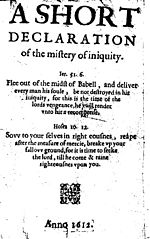Thomas Helwys
Thomas Helwys (* around 1550 in Nottinghamshire ; † 1616 in Newgate , England) is considered to be a co-founder of the Baptists and an early champion of religious freedom alongside John Smyth .
Beginnings
Thomas Helwys was the second-born son of the couple Edmund and Margaret Helwys. They were descendants of a long-established Norman family who owned not insignificant estates in Lincoln , Northampton , Nottingham and York . Thomas Helwys grew up in the English county of Nottinghamshire . When Edmund Helwys died in 1590, the now forty-year-old took over his father's business, but only a short time later passed it into the hands of friends of the family in order to begin studying law at Gray's Inn , one of England's most renowned law schools . In 1593 he passed his law exam, took up the profession of lawyer and took up residence in London for two years .
In 1595 Thomas Helwys married Joan Ashmore in St. Martin's Church in Bilborough / Nottingham. Their marriage had seven children. His house, Broxtowe Hall , developed into a place of refuge and meeting place for free-church- oriented Christians, who, as so-called dissenters, gathered outside the Church of England for common Bible study and prayer . Through John Smyth, a former Anglican clergyman, he found contact with the separatist community in Gainsborough , whose 60 to 70 members met in secret for fear of persecution.
As a religious refugee in Amsterdam
However, the meetings of the dissenters did not remain hidden from the state church authorities. In 1606, therefore, part of this community left England and found asylum in Amsterdam ( Netherlands ). Among the religious refugees were Thomas Helwys and John Smyth , who soon took over the leadership of the refugee community. The circle around Smyth began to make contact with the Amsterdam Mennonite congregation and thus came into contact with the Anabaptist beliefs . In 1609 John Smyth was baptized by a Mennonite pastor based on his personal creed . He then baptized the members of his congregation - among them Thomas Helwys.
Foundation of the first Baptist church
In 1611 Helwys returned to England with a small group of the Amsterdam asylum seekers' community. Immediately after their arrival they got together and founded the first Baptist church. This laid the foundation for a church fellowship that is still growing today. The church movement founded by Helwys was later named General Baptists because, in contrast to the younger Particular Baptists, they taught "general ( general ) reconciliation through Christ , which is imputed to the believer".
Demand for religious freedom
As a persecuted minority church, the Anabaptists have been demanding freedom of belief and conscience since their formation in the 16th century. Like John Smyth and Roger Williams , Helwys was in this tradition. As early as 1610, he wrote his well-known A Short Declaration of the Mystery of Iniquity (A Short Declaration of the Secret of Injustice). He brought them with him on his return to England and arranged for their publication there. It is the first printed call in English for total freedom of belief for all. Among other things, it says in it: Our lord the king is only an earthly king and therefore as king he only has authority in earthly matters, and if the king's people are obedient and true subjects who obey all human laws passed by the king our Lord the King cannot ask for more. for the religion of men to God exists between God and themselves, the king should not speak for it, nor should the king be a judge between God and man. If they are to be heretics , Turks , Jews or something else, it is not up to earthly power to punish them in the slightest.
Helwys dedicated this book to King James I of England with the following appeal: Listen, Lord, and do not despise the advice of the poor, and let their complaints come before you. The king is a mortal person and not God , and therefore he has no power over the immortal souls of his subjects, to issue laws and regulations for them and to set spiritual masters over them. If the king has authority to enact spiritual masters and laws, then he is an immortal god and not a mortal man. O king, do not let deceivers seduce you into sin against God, whom you should obey, nor against your poor subjects, who should obey you and will do so with body, life and goods, if not, their lives should be from this one Earth.
Because of this dedication, Thomas Helwys was captured and sent to prison. Helwys died here as a martyr in 1616 . By the way, King James, on whose instigation Helwys was imprisoned, was the original editor of the well-known English King James Bible .
literature
- Thomas Helwys: A Short Declaration of the Mystery of Iniquity , 1612 - Kingsgate Press facsimile 1935; the above quotations are taken from the facsimile (p. 69).
- JD Hughey: The Baptists - Doctrine, Practice, History , Kassel 1959
Web links
| personal data | |
|---|---|
| SURNAME | Helwys, Thomas |
| BRIEF DESCRIPTION | Co-founder of the Baptists and early champion of religious freedom |
| DATE OF BIRTH | around 1550 |
| PLACE OF BIRTH | Nottinghamshire |
| DATE OF DEATH | 1616 |
| Place of death | Newgate , England |

